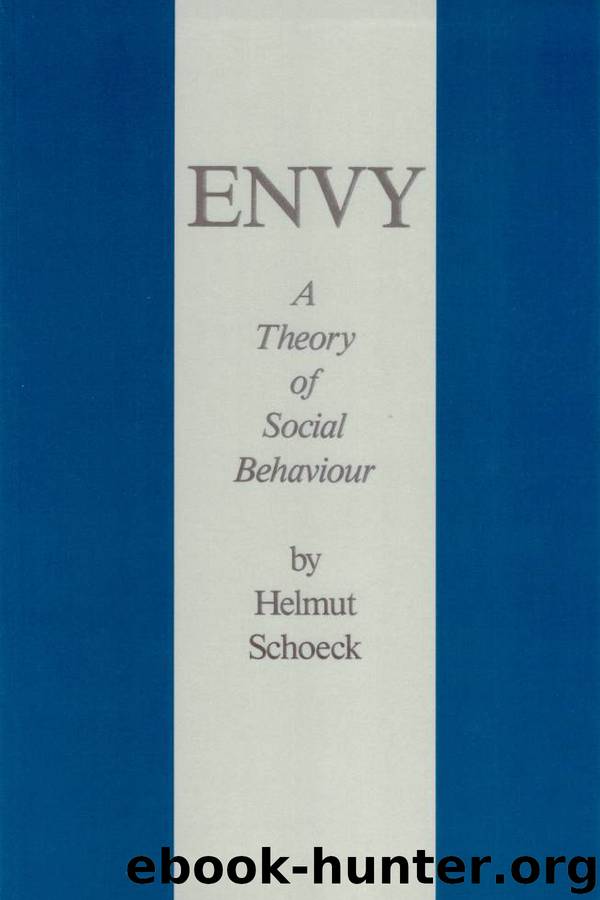Envy: A Theory of Social Behaviour by Helmut Schoeck

Author:Helmut Schoeck
Language: eng
Format: epub
ISBN: 0-86597-063-7
Publisher: Liberty Fund
Published: 1965-12-31T16:00:00+00:00
Envy-indignation
Rivarol, another French moralist, had already pointed out the remarkable fact that the mental faculty of comparison, which in the intellect is a source of justice, is a source of envy in the heart. Raiga elaborated this idea.[68] Envy invariably arises out of the comparison of two situations. By definition, the very possibility of comparison must involve the diagnosis of inferiority in one of the parties. As we shall repeatedly see, this is not at all dependent upon either the absolute level of the persons under comparison or the absolute distance between them. Comparison is potential envy, in so far as no compensatory views and feelings effectively intervene. Envy and indignation are regarded by Raiga as identical psychological processes, but there are two kinds of envy—common and vulgar envy, which is reprehensible, and hence generally concealed, and envy-indignation, which may be excused or even justified[69] (Francis Bacon’s ‘public envy’). Both kinds of envy, Raiga says, have the same origin. The distinction between them depends on people’s impartiality and their sense of what is just and fair.
Raiga indicates that his concept ‘envy-indignation’ resembles the concept of nemesis described by Aristotle in the Nicomachean Ethics—general indignation, a feeling between envy and malignance. (Nemesis, the Greek goddess, was responsible for good measure, and was regarded as the enemy of too much happiness, this embodying what the Greeks considered to be the envy of the gods.) Raiga writes: ‘The noble action demanded by morality is that one should rejoice with others in their happiness, gaudere felicitate aliéna, a virtue, indeed, which fine natures put into practice, but envy is there, ubiquitous upon this earth, and everything that contributes to the pride and joy of others causes it to suffer.’[70]
Behind destructive and impotent envy Raiga recognizes that natural impulse or drive without which much of what we call civilization would never have come into being. The problem of the envy-ridden man is, indeed, to know whether his indignation is legitimate. We shall be confronted more than once in this book with the problem of the true and false legitimization of envy.[71]
Envy is a subdued frame of mind, and is mostly camouflaged. One of its favourite weapons is irony. Raiga recalls Bergson’s study of laughter of which the original function was to denigrate and to intimidate. The strategy of envy has always included the glorification of modesty and the censure of pride, which is called a sin. It may be presumed that those who feel pride are fewer than those who ascribe it to others and begrudge it them.
Within the nuclear family, that is, between husband and wife, parents and children, envy, Raiga feels, should not be found. Among themselves they are equal, and the good of each one contributes to the good of the whole small group. As experience shows, however, the social structure of the family is in many cases unable to obviate tormenting and destructive feelings of envy among its members. (Here Raiga is not speaking of jealousy, to which the family is particularly prone.
Download
This site does not store any files on its server. We only index and link to content provided by other sites. Please contact the content providers to delete copyright contents if any and email us, we'll remove relevant links or contents immediately.
The Art of Thinking Clearly by Rolf Dobelli(8896)
The 5 Love Languages: The Secret to Love That Lasts by Gary Chapman(8569)
Mindhunter: Inside the FBI's Elite Serial Crime Unit by John E. Douglas & Mark Olshaker(7873)
Becoming Supernatural by Dr. Joe Dispenza(7141)
The Road Less Traveled by M. Scott Peck(6670)
Nudge - Improving Decisions about Health, Wealth, and Happiness by Thaler Sunstein(6661)
Enlightenment Now: The Case for Reason, Science, Humanism, and Progress by Steven Pinker(6432)
Win Bigly by Scott Adams(6341)
Mastermind: How to Think Like Sherlock Holmes by Maria Konnikova(6275)
The Way of Zen by Alan W. Watts(5828)
Factfulness: Ten Reasons We're Wrong About the World – and Why Things Are Better Than You Think by Hans Rosling(4043)
The State of Affairs by Esther Perel(3964)
Gerald's Game by Stephen King(3944)
Man's Search for Meaning by Viktor Frankl(3671)
The Confidence Code by Katty Kay(3596)
Thinking in Bets by Annie Duke(3554)
The Worm at the Core by Sheldon Solomon(2946)
Enlightenment Now by Steven Pinker(2932)
Liar's Poker by Michael Lewis(2832)
